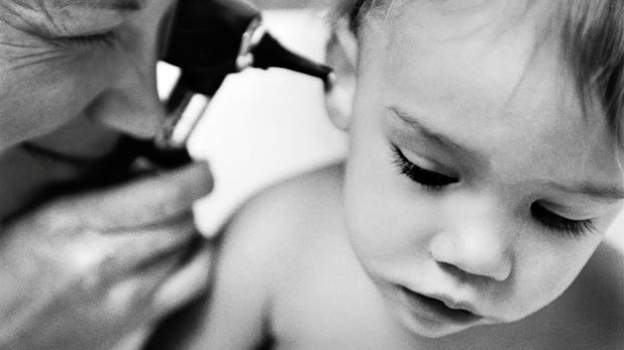SingaporeMotherhood | Baby & Toddler
January 2015
When Your Child Has An Ear Infection
If your child has been pulling at his ears or complaining of pain in his ears, do not ignore him. He could be having an ear infection. Left untreated, this could lead to damaged eardrums which require surgery to correct.
[banner][/banner]
Types of Ear Infections in Children
Middle ear infections are particularly common in babies and children. The source of the infection is either a block of the Eustachian tube (the part that connects the middle ear to the upper throat) or an infection that has ascended from the nose, throat or back of the nose. Middle ear infections in the young are as common as the occurrence of enlarged adenoids, tonsils and recurrent allergic sinusitis.
“There are two types of ear infections,” explains Dr Stephen Lee, Specialist in Ear, Nose and Throat Surgery and Consultant at Raffles ENT Centre. “Infections which affect the outer or external ear are known as otitis externa. (involving the part of the ear superficial to the eardrum) “The other infection affects the middle ear and is known as otitis media. This involves the airspace in the middle of the ear. This space is connected to the back of the nose by a tube known as the Eustachian tube.”
“The other point to note is that the Eustachian tube tends to be more horizontally placed as well as relatively wider in babies and infants. Thus, during milk feeding, they are more prone to experience a back flow into the middle ear, leading to infections.”
As toddlers may not be able to verbally communicate yet when they experience discomfort, it is not always easy to find out what they are going through. Therefore, in order to diagnose their condition, look out for symptoms that might indicate an ear infection.
Symptoms may include the following: (as listed by Dr James Cheong, family physician at Unity Family Medicine Clinic):
• Irritability
• Difficulty in sleeping
• Inconsolable crying accompanied by fever
• Ear discharge (ranging from fluid to pus)
• Ear pain
• Persistent pulling of ears
• Reduced hearing
• Loss of balance
• Poor appetite
• Vomiting
• Diarrhoea
Treatment of Ear Infections in Children
How you treat ear infections will depend on the type and source of infection. “If it’s an external ear infection, ear drops are helpful,” says Dr Lee. “If it’s a middle ear infection, use of nasal decongestants and antibiotics might be indicated. If this happens repeatedly, you need to see an ENT surgeon to assess the cause.”
If the cause of your child’s ear infection stems from the Eustachian tubes, this will most probably improve with time. As their Eustachian tubes grow and mature, their ear issues will improve and be easier to manage.
“The inadequacy of the functional Eustachian tubes will usually improve with progressive development and maturity of the Eustachian tubes,” explains Dr Foo Toon Hiong, Specialist in Ear, Nose and Throat Surgery & Consultant at Raffles ENT Centre.
“The Eustachian tubes in children reach the full length of an adult’s at around the age of six but full functional maturity is only attained in early adulthood. Therefore, ear problems in children improve and steadily are under control as they grow older.”
Preventing Ear Infections in Children
But while you are waiting for that to happen, you would be pleased to know that there are ways to prevent ear infections in babies and children. For babies, it’s as simple as remembering to burp them well after they have been fed.
For children, preventive measures can help. Reduce the intensity of the allergic inflammation of the nasal airways with topical nasal steroid spray, frequent saline nasal douching or manipulate your environment to control its allergen load. For instance, take measures to reduce house dust mites, suggests Dr Foo. Doing this will help make it easier to control the sources of infection in the adenoid, nasal cavities, and paranasal sinuses. “The clearance of the mucus secretion from the middle ear space becomes easier,” adds Dr Foo.
Dr Cheong says that medical research has shown that the following measures can help to prevent ear infections:
• Breastfeeding your child for at least six months
• Getting your child vaccinated against pneumococcus and influenza
• Avoiding exposure of your child to tobacco products
• Minimising the use of pacifiers and bottle-feeding
• Avoiding ‘bottle propping’ (bottle-feeding the child lying down)
• Chewing of xylitol gum in older children six years and above. Parents can administer two pieces, three to five times a day, for at least five minutes daily.
Have your child evaluated if you suspect that an allergy may be causing persistent nasal congestion and secretions. Other simple measures include observing good general hygiene and minimising contact with other persons who may be down with an infection. But if your child does end up with an ear infection, how should you deal with it?
Dealing with Ear Infections in Children
“If the infection is mild, the child usually recovers on their own,” says Dr Cheong. “Antibiotics may be required for serious cases. However, not all cases require antibiotics immediately and a two to three day observation may be advised, to monitor the recovery process.”
“Some children with recurrent ear infections or fluid in their middle ear due to the infection may require insertion of a tube into the ear drum (tympanostomy) to treat and prevent future infections. Damaged eardrums from persistent or recurrent infections may also require reconstructive surgery.”
Recurrent ear infections, if not treated, can cause lasting damage to your child’s ear. In some cases, it can even affect your child’s long-term hearing ability. In severe cases, there may even be a risk of complications such as meningitis, cerebral abscess, and sinus thrombosis. So do keep an eye out for your child’s ear health.
All content from this article, including images, cannot be reproduced without credits or written permission from SingaporeMotherhood.
Follow us on Facebook, Instagram, and Telegram for the latest article and promotion updates.






